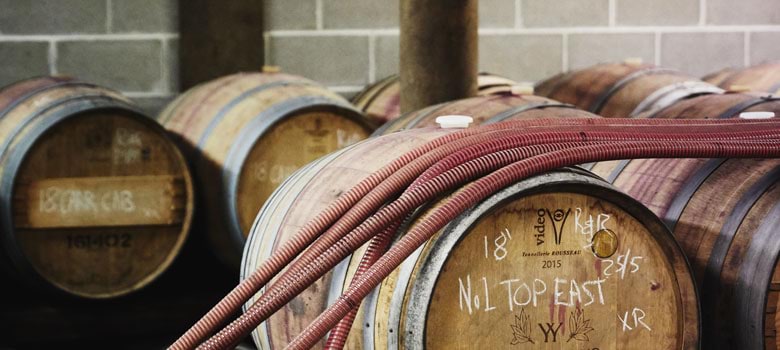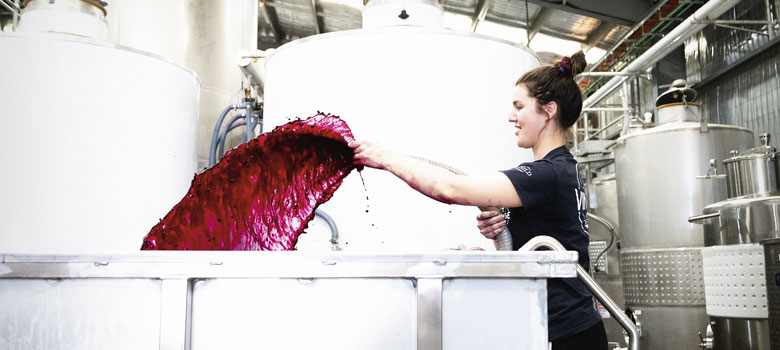
Wine
The Other Side of Wine
We usually visit wineries to relax and escape the everyday. What we don’t see is the flurry of activity behind the scenes, keeping these complex businesses humming.
As drinkers, we are far removed from the inherent complexity involved in running a wine business. Wine is an agricultural industry, first and foremost. Then there’s the manufacturing component that gets liquid into bottle, and the logistics involved with distribution across Australia and possibly overseas.
The wine doesn’t sell itself, so wineries have to be pretty shrewd at sales and marketing, too. That probably means having a good handle on e-commerce; a hospitality presence in the form of a cellar door, at a minimum; and also running regular events that ensure drinkers maintain a genuine connection with your brand.

Above: One of the many sites of action at Schild Estate
Ensuring all these different parts of the business come together efficiently and effectively are the winery executives. But while their titles are similar, if you asked a group of these overseers what keeps them up at night, you would likely hear a raft of different answers.
Each wine business has its own idiosyncrasies, so management roles have contrasting remits. However, some themes emerge, such as the importance of communication to ensure harmony between employees and the many different departments.
“People tend to multitask in smaller wine businesses, so therefore communication is important to make sure everything runs smoothly and everyone gets all the information they need, because everyone’s busy,” says Sue Henderson, CEO of Barossa Valley winery Schild Estate.
“We’re highly dependent on nature, and you only get one crack at it every year. When things go wrong, it can strip a lot of cash out of your business really quickly.”
Burch Family Wines general manager Natalie Burch says her role requires being “always plugged in” to all departments of the business.
“The diversity of the wine world means it is a very diverse role,” she says. “I need to be aware of what every department is doing, where they’re struggling, why they’re struggling and what they need to mend those gaps.”
Sarah Crowe joined Yarra Yering as winemaker in late 2013, but has since taken on extra responsibilities as general manager.
“It’s not as much fun as one might think!” she says. “The winemaking is the fun part and I’d have to say the easy part now, as well.”
Crowe says communication is especially important at Yarra Yering, being a very small winery with just seven full-time employees.
“It only takes one person who is not in a great frame of mind to impact on every single other person in the business,” she says. “If people are kept properly informed of what’s going on and there’s no secrets, they feel valued within the business.”
Yarra Yering winemaker and general manager Sarah Crowe; Sandy Hallett (centre), owner and director of Alkoomi Wines flanked by husband Rod and senior winemaker Andrew Cherry.
Sandy Hallett, owner and director of Alkoomi Wines in Frankland River, WA, says her job is about managing staff and “putting fires out”.
“It goes from selling wine to checking the accounts to making sure staff are working properly to cleaning the toilets if there’s no-one there to do it,” she says.
“Sometimes I’m needed on the bottling line, and on the weekends I work in the cellar door… literally whatever needs to be done is what I do.”
Sandy makes all the staff breakfast every morning at vintage time, and dinner if they work late at night. “I’m a bit of a mum and I take care of all our staff. We’re quite isolated, so keeping good staff is really important,” she says.
Behind the wheel
Bimbadgen Wines general manager Belinda Stapleton says the majority of her time is spent steering the company’s employees, who have varying focuses, in the same direction.
“That’s quite a task!” she says. “We have to think a lot about people; as in our consumers, and people; as in our team. “We run both a product-based and experience-based business, so how the end consumer enjoys our wine or our experiences is really important.”
Bimbadgen Wines general manager Belinda Stapleton; Burch Family Wines general manager Natalie Burch with her brother
Natalie Burch believes culture is key, in managing the 80-strong Burch Family Wines business that is spread across different sites.
“I don’t think you can make great wines if no-one wants to be in the workplace where they are created,” she says. “There are a lot of different personalities and skills and focuses. Motivating, supporting, and sometimes pushing those teams is a fine balance.”
Then there’s the general unpredictability of the sector. The wine industry is at the mercy of nature and geopolitical forces like the China tariffs, not to mention the disruption of a global pandemic.
“There are often things coming at you that you can’t control,” says Sue Henderson.
She points to low yielding vintages in 2019 and 2020 as other recent curveballs.
“When you have a crop size that’s 50 per cent down, that means you are running half the amount of grapes through the winery,” she says.
“Fixed costs remain the same, but your turnover is less, so your cost of goods doubles. That makes it very hard for you to create profit at sustainable rates for the next two to three years. Those sorts of impacts, they’re not slight. They’re significant.”
Henderson adds that the trading environment has become increasingly complex since she joined the industry in the 1990s.
“Now, the global wine industry is completely saturated with product and over-supplied,” she says. “The marketplace has become very noisy and it’s very hard to get your message to
the consumer.”
Pouring authenticity
Brad Russ, general manager of Tulloch Wines in the Hunter Valley, says consumers have also become more educated and demanding.
“People are much more discerning about the brands they want to engage with. They want an authentic story,” he says.
Russ joined Tulloch 12 years ago with the remit of strengthening its direct-to-consumer business.
“This is about making sure the experiences people get when they come to the cellar door are the best they can possibly be, so that we can then foster a long-term connection with them,” he says.
Sue Henderson, CEO of Schild Estate; Brad Russ, general manager of Tulloch Wines
The cellar door also acts as an important market research opportunity for the business.
“What people are demanding at the coal face triggers opportunities for wine styles and products that could be introduced,” says Russ.
“Working with a brand like Tulloch that is 126 years old, you’ve really got to be mindful of the tradition of the brand, but also tapped in to consumer trends so you can introduce it to the next generation of wine drinkers.”
Natalie Burch sees herself as a problem solver. “Ideally you see problems in advance, but when you don’t, you gather the team to find the best way to tackle whatever issue that may be,” she says.
“My job is a bit like a chess board. You’ve got all sorts of possible moves the world can make against you and it’s your job to position your pieces strategically to gain the best outcome,” says Burch.
“You’ve got to think several moves ahead and sometimes you have to be reactive.”